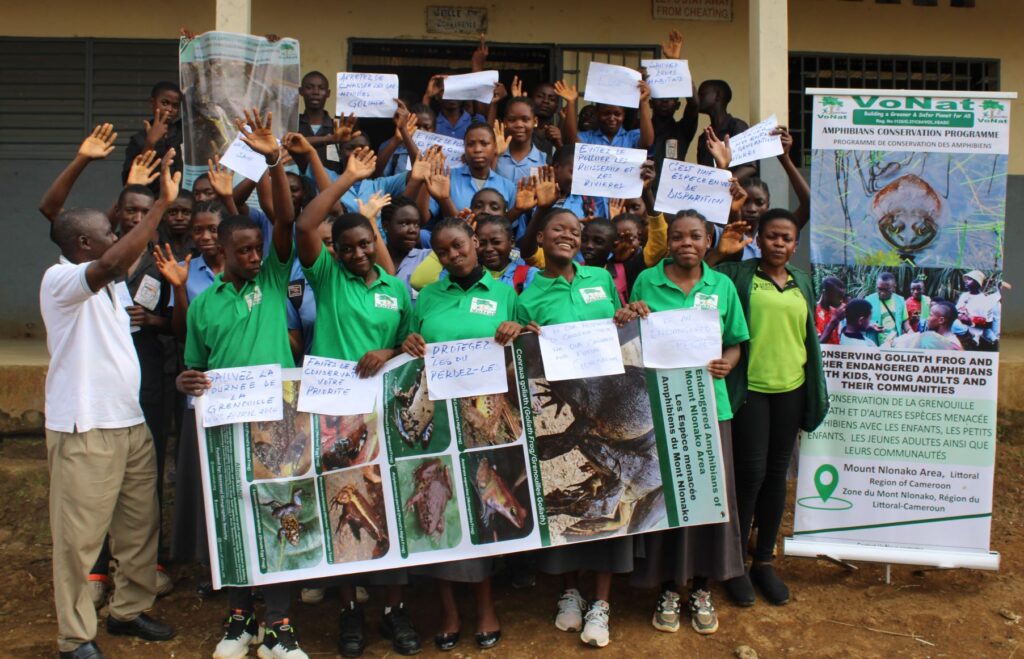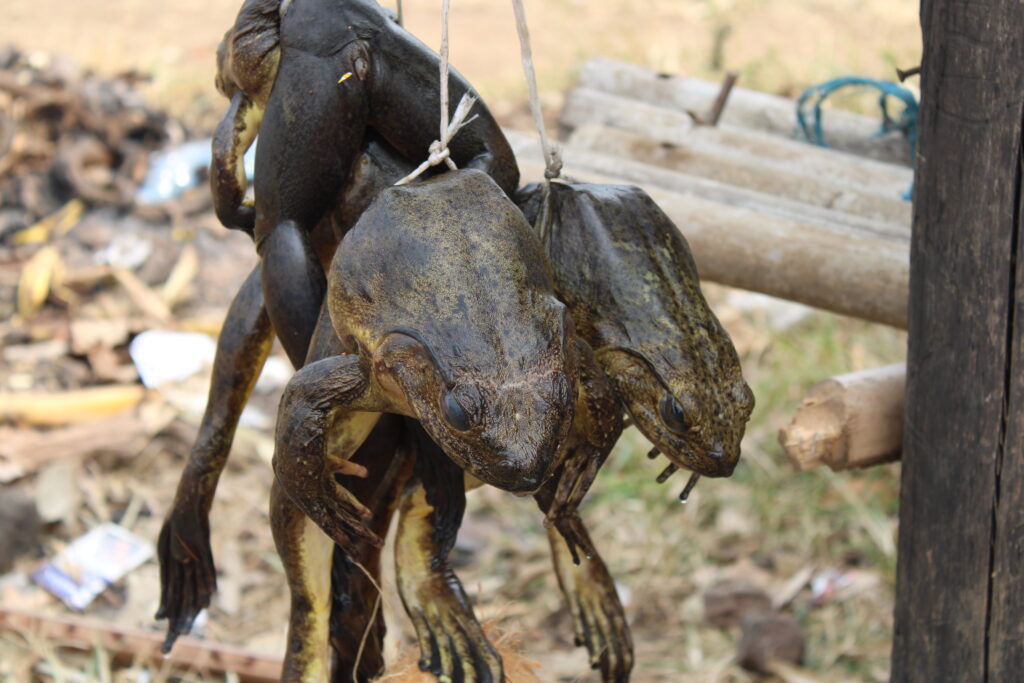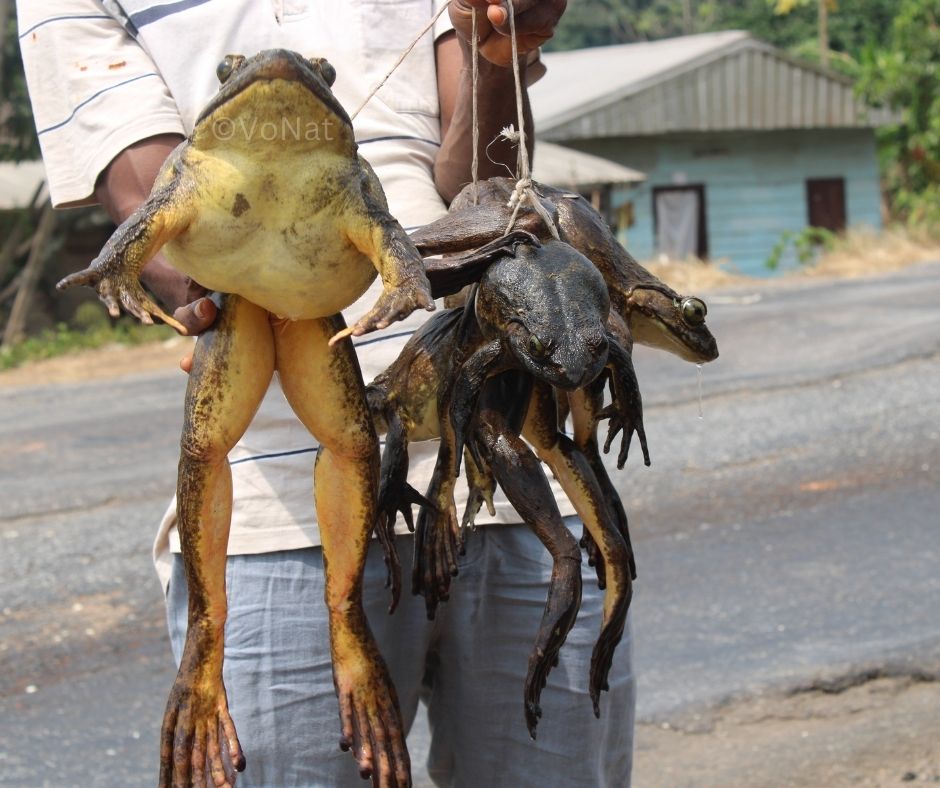Featured photo © Ndimuh Bertrand Shancho/ Voice of Nature (VoNat)
Voice of Nature (VoNat), a Cameroon-based biodiversity conservation and sustainable development non-profit organization and Amphibian Survival Alliance Partner, is working tirelessly to combat the depletion of endangered amphibians in Cameroon, with primary focus the endangered Goliath Frog, the world’s largest frog, found only in Cameroon and Equatorial Guinea.
The giant slippery frog, in the Mount Nlonako-Muanengouba landscape of Cameroon, is 32 centimeters long and can weigh up to 3.3 kilograms, about the size of a newborn baby. The frogs live in secondary forests and beside swift flowing rivers and waterfalls from where they come out at night to feed on insects, fish and other smaller amphibians. Through their feeding habit, they contribute to limiting the spread of malaria and yellow fever, which are deadly diseases in Cameroon and other parts of Africa. Despite the invaluable role of this emblematic species in fighting and mitigating the spread of diseases and marinating the ecosystem, over 20,000 individuals of the already endangered species are hunted every peak season for pet trade and food. There are fears that these frogs may disappear from the earth surface sooner than expected, if no urgent actions are taking now to conserve them.
Cognizant of this, VoNat has been actively engaging local communities in actions geared towards saving the giant slippery frog and other amphibians in Cameroon. With support partners, the organization has leveraged the power of experiential education, ecological studies, and media arts tools to inspire, mentor, and engage over 100 kids and young adults in raising goliath frog and other endangered amphibians’ conservation consciousness amongst over 5000 community members in the Mount Nlonako Area.
“We belief that educating and engaging the children in fighting against the wanton depletion of the goliath frog will ensure sustainability. This is because they are the leaders of tomorrow and will be the ones to take decisions and enact laws regarding the conservation of the species. Also, they will be able to take the conservation message to their parents, who will belief more in them than strangers,” Mr. Nkede Henry Nkede, VoNat’s Amphibians Conservation Initiative’s Field Coordinator said.

Photo © Raymond Assurance / Voice of Nature (VoNat)
VoNat has constituted the 100 youngsters into a network dubbed “Youth of Mount Nlonako for Endangered Amphibians Conservation (YMEAC)”, and continues to guide them in taking independent actions to educate their peers and parents to conserve endangered amphibians.
“It is our responsibility to conserve the goliath frog for our children and children’s children to grow and also see. I call on the population to make goliath frog conservation their priority; stop water pollution, deforestation, setting of traps and indiscriminate hunting to save the goliath frog at brink of extinction,” Bothcou Marie Therese, the Coordinator of YMEAC, said.
Endangered Amphibians Conservation Consciousness Gaining Grounds
VoNat and YMEAC’s determination and steadfast actions for the conservation of the goliath frog and other endangered amphibians in the Mount Nlonako Area has enhanced conservation consciousness amongst local leaders, with many pledging their support. The Divisional Officer of Nlonako Subdivision, Mr Elenga Abina Alphonse, says “These endangered species and their habitats have to be conserved. I received in audience the Executive Director of VoNat and have pledged my support for this initiative”.
The traditional ruler of Mangamba, Chief Roland Essengue Mbonda, says “I agree with the children that the goliath frogs are other species in this area is our patrimony, inherited from our ancestors. It is our responsibility to conserve them for our children and the future generation. So, we will take necessary dispositions to ensure that they don’t become extinct”.
The Nlonako Sub divisional Delegate of the Cameroon Ministry of Forestry and Wildlife (MINFOF), Madam Mokete Stella recommends that “VoNat should support Government’s efforts by creating touristic sites for frog watching”. According to her, such action will contribute to conserving the frogs and their habitats while contributing to local development.
Frog Hunters Demand Alternatives
Though some hunters are conscious that their wanton hunting activities are driving the goliath frogs gradually towards extinction, they say it remains a key source of protein and livelihoods for them and their families. According to one of the hunters Mr. Lakatouch, “the frog is our own meat. You cannot eat plantains without meat; it cannot go. We also sell some to pay rents and meet the needs of our family”. The hunter adds: “if I have another means of survival or a lucrative business, I will not be risking myself at night hunting the frogs. It will provide enough money that I can buy fish or chicken as meat for the house”.

Photo © Ndimuh Bertrand Shancho/ Voice of Nature (VoNat)
Mr. Mbapeh Njoh Richard, is aware that hunting the goliath frogs and other endangered species is against the Cameroon Forestry Law but insists it is brisk business. “We sell the goliath frog for up to XAF 20000 (about $40) depending on the size. So stopping it is not easy,” he quips.
With more and more conservation consciousness being generated within communities in the Mount Nlonako area, VoNat has extended her amphibian conservation actions to Cameroon’s first and newly created Mount Muangengouba Herpato-ornithological Sanctuary, and currently engaging local community stakeholders in mapping the distribution and ecological threats to the remnant Goliath frog and other endangered amphibians in Cameroon.

